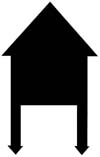(published Late in the Year, 2000)

One evening, as he wove his way out of the building, shoulders slumped and aching, hands thrust deeply into his pockets, the teacher-to-be saw a finch careering desperately down the halls, amidst the cubicles, trying to find its way out of the heart of the beige maze.
The young man watched the little bird, tracked its panicked path along the ceiling, among the fluorescent fixtures.
"This," the teacher-to-be noted, "is not a metaphor for my life."
Seito, a student, approached the younger teacher with many questions about the dimensions of grief. The teacher dug his hands deeply into his pockets.
"I recall once," he said as he brought out a quarter and fed it into the pinball machine, "when my sister got a bad haircut. She came home in tears, but had to leave soon after because she had an appointment for lunch. Hours later she returned, again in tears: she'd learned that one of her friends— a man she'd once loved— had died."
The teacher's eyes tracked the gleaming ball as it careered about among the lights and bumpers.
"These tears were indistinguishable."
"This koan," the elder teacher began, closing her eyes, "is not about love:
"I knew a young man once, a student, who discovered one evening, quite by accident, that the key to the front door of his apartment building would also open the front door to his beloved's home. At first he did not note this strange coincidence— his mind was elsewhere. Absently glancing down, he noticed that it was his dull brass key protruding from her lock. He pulled the key out, looked at it, compared it to the shiny silver housekey his love had made for him at the hardware store.
"Did they look the same? His was a renter's key, worn smooth as beach-glass by hand after hand; hers flashed brightly in the porch-light, its fresh teeth blade-sharp. They were similar, yes, but by no means identical. Not nearly so similar as one thinks keys to the same lock ought to be.
"The man twisted his key in the lock: the bolt slid out, then in. He tried his loved's key: lock, unlock, chunck, clunk. And his own key again: ch-clunk, ch-clunk. The two keys were interchangeable.
"How strange, the man thought. How wonderful— I shall tell my Heart of hearts this straightaway. And he did.
"The next morning he left early, having things to attend to in his apartment. On his way out, he locked his loved's door with his key. Arriving home, the man slid his lover's shiny, silver key into his own door, turned—
"But the lock didn't budge. He tried again, harder: Nothing. He slid the key out, then in again, jiggled, rattled, jimmied to better seat the key's teeth among the pins and tumblers. Nonetheless, the bolt refused to yield."
"But teacher," Seito said after long contemplation, "this koan is clearly about the asymmetry of love."
The elder teacher opened her eyes and turned away from her student, "You have not listened at all."
Seito was in an airplane, traveling to study with a very great teacher. He hated flying, but was distracted from this fear by his greater fear that he was not worthy of such a teacher's precious, finite time. He had studied with so many teachers, and yet . . .
Suddenly Seito heard a pop and hiss, like a soda can being opened. The gold cups dropped from the overhead compartments. There was a commotion, the passengers called out, but could find no stewardesses to reassure them. The door to the pilots was locked, the intercom silent.
Soon the cabin grew cool, calm, the air rare and precious, buoyant as a monarch's wing. The student's fears, all of his fears, melted. He felt lighter and lighter, his brain warmer and warmer, like a coil heating.
The other passenger's quieted, settled back into their seats. They looked on, breathlessly euphoric: the cabin was turning to dusky gold. Their heads roared with serpent's-tongues of laughter as their lungs turned to iron.
The student looked down into the sun-drenched bed of clouds and, to his astonishment, saw a triple rainbow arranged in concentric rings.
He smiled.
"This," he gasped as his brain curled and faded, "this is quite auspicious."
At a student's funeral two teachers meet— or, better put, meet again. The elder brushes her hair back from her eyes. The younger looks to the ground, buries his hands in his pockets.
"Your key," he says, "didn't fit my door."
"That's because your heart really was a bird trapped in an office building."
Does she, perhaps, rest her small hand upon his chest? Does he, just maybe, reach out to stroke her hair?
Share on Facebook
![]() Tweet about this Piece
Tweet about this Piece
or:
"Tod" means death in German, the very language of Death
Fiction Archives